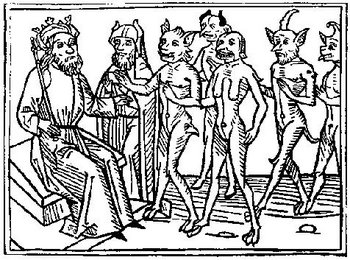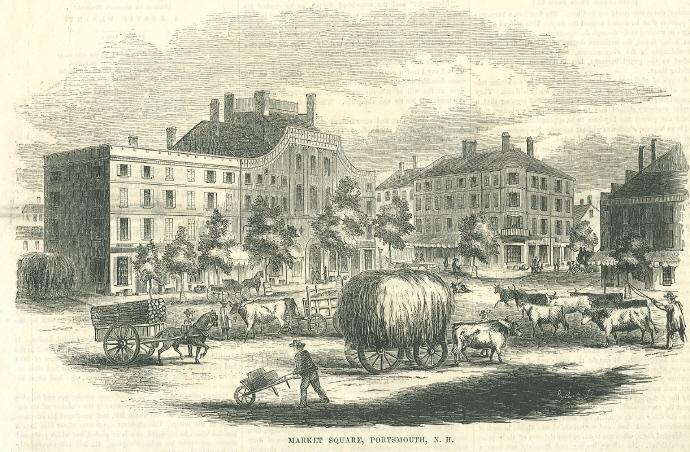|
Candlemas Massacre
The Raid on York (also known as the Candlemas Massacre) took place on 24 January 1692 during King William's War, when Chief Madockawando and Father Louis-Pierre Thury led 200-300 natives into the town of York (then in the District of Maine and part of the Province of Massachusetts Bay, now in the state of Maine), killing about 100 of the English settlers and burning down buildings, taking another estimated 80 villagers hostage. The villagers were forced to walk to Canada, New France, where they were ransomed by Capt. John Alden Jr. of Boston (son of John Alden and Priscilla Mullins of the Plymouth Colony). One of those taken captive was a young Jeremiah Moulton, who would later gain notoriety during the Father Rale's War. Capt. Floyd wrote that "the houses are all burned and rifled except the half dozen or thereabout"...later in the same letter he adds: "there is about seventeen or eighteen houses burned".Banks, Charles EdwardHistory of York, Maine, successively known as Bristol ... [...More Info...] [...Related Items...] OR: [Wikipedia] [Google] [Baidu] |
King William's War
King William's War (also known as the Second Indian War, Father Baudoin's War, Castin's War, or the First Intercolonial War in French) was the North American theater of the Nine Years' War (1688–1697), also known as the War of the Grand Alliance or the War of the League of Augsburg. It was the first of six colonial wars (see the four French and Indian Wars, Father Rale's War and Father Le Loutre's War) fought between New France and New England along with their respective Native allies before France ceded its remaining mainland territories in North America east of the Mississippi River in 1763. For King William's War, neither England nor France thought of weakening their position in Europe to support the war effort in North America. New France and the Wabanaki Confederacy were able to thwart New England expansion into Acadia, whose border New France defined as the Kennebec River in southern Maine. According to the terms of the 1697 Peace of Ryswick that ended the Nine Years' ... [...More Info...] [...Related Items...] OR: [Wikipedia] [Google] [Baidu] |
Canada, New France
The colony of Canada was a French colony within the larger territory of New France. It was claimed by France in 1535 during the second voyage of Jacques Cartier, in the name of the French king, Francis I. The colony remained a French territory until 1763, when it became a British colony known as the Province of Quebec. In the 16th century the word "Canada" could refer to the territory along the Saint Lawrence River (then known as the Canada River) from Grosse Isle to a point between Québec and Trois-Rivières. The terms "Canada" and "New France" were also used interchangeably. French explorations continued west "unto the Countreys of Canada, Hochelaga, and Saguenay" before any permanent settlements were established. In 1600 a permanent trading post and habitation was established at Tadoussac at the confluence of the Saguenay and Saint Lawrence rivers. However, because this trading post was under a trade monopoly, it was not constituted as an official French colonial set ... [...More Info...] [...Related Items...] OR: [Wikipedia] [Google] [Baidu] |
Military History Of Acadia
A military, also known collectively as armed forces, is a heavily armed, highly organized force primarily intended for warfare. It is typically authorized and maintained by a sovereign state, with its members identifiable by their distinct military uniform. It may consist of one or more military branches such as an army, navy, air force, space force, marines, or coast guard. The main task of the military is usually defined as defence of the state and its interests against external armed threats. In broad usage, the terms ''armed forces'' and ''military'' are often treated as synonymous, although in technical usage a distinction is sometimes made in which a country's armed forces may include both its military and other paramilitary forces. There are various forms of irregular military forces, not belonging to a recognized state; though they share many attributes with regular military forces, they are less often referred to as simply ''military''. A nation's military ma ... [...More Info...] [...Related Items...] OR: [Wikipedia] [Google] [Baidu] |
List Of Massacres In Maine
This is a partial list of massacres in the United States; death tolls may be approximate. :*For single-perpetrator events and shooting sprees, see List of rampage killers in the United States, Mass shootings in the United States, :Spree shootings in the United States, and :Mass shootings in the United States by year :*For Indian massacres, see Indian massacres. List See also * List of ethnic riots#United States * List of incidents of civil unrest in the United States * List of rampage killers (school massacres) * List of school massacres by death toll * Mass racial violence in the United States * Murder of workers in labor disputes in the United States References {{massacres United States Massacres * Massacres massacre A massacre is the killing of a large number of people or animals, especially those who are not involved in any fighting or have no way of defending themselves. A massacre is generally considered to be morally unacceptable, especially when ... [...More Info...] [...Related Items...] OR: [Wikipedia] [Google] [Baidu] |
Beliall
Belial ( he, , ''Bəlīyyaʿal'') is a term occurring in the Hebrew Bible/ Old Testament which later became personified as the devilSee the reference to "Beliar" in ''The Ascension of Isaiah'', at EarlyChristianWritings.com', specifically at 1:8–9, 2:4, 3:11–13, 4:2, 4:14–18, 5:1, 5:15. in Christian texts of the New Testament. Alternate spellings include Baalial, Balial, Belhor, Beliall, Beliar, Berial, Bylyl and Beliya'al. In the Secret Book of John, an early Gnostic text, the ruler of the underworld is referred to as Belias. Hebrew Bible/Old Testament ''Belial'' is a Hebrew word "used to characterize the wicked or worthless". The etymology of the word is often understood as "lacking worth", from two common words: ''beli-'' (בְּלִי "without-") and ''ya'al'' (יָעַל "to be of value"). Some scholars translate it from Hebrew as "worthless" (''Beli yo'il''), while others translate it as "yokeless" (''Beli ol''), "may he have no rising" or "never to rise" (''Beli ... [...More Info...] [...Related Items...] OR: [Wikipedia] [Google] [Baidu] |
Portsmouth, New Hampshire
Portsmouth is a city in Rockingham County, New Hampshire, United States. At the 2020 census it had a population of 21,956. A historic seaport and popular summer tourist destination on the Piscataqua River bordering the state of Maine, Portsmouth was formerly the home of the Strategic Air Command's Pease Air Force Base, since converted to Portsmouth International Airport at Pease. History American Indians of the Abenaki and other Algonquian languages-speaking nations, and their predecessors, inhabited the territory of coastal New Hampshire for thousands of years before European contact. The first known European to explore and write about the area was Martin Pring in 1603. The Piscataqua River is a tidal estuary with a swift current, but forms a good natural harbor. The west bank of the harbor was settled by European colonists in 1630 and named Strawbery Banke, after the many wild strawberries growing there. The village was protected by Fort William and Mary on what is now ... [...More Info...] [...Related Items...] OR: [Wikipedia] [Google] [Baidu] |

